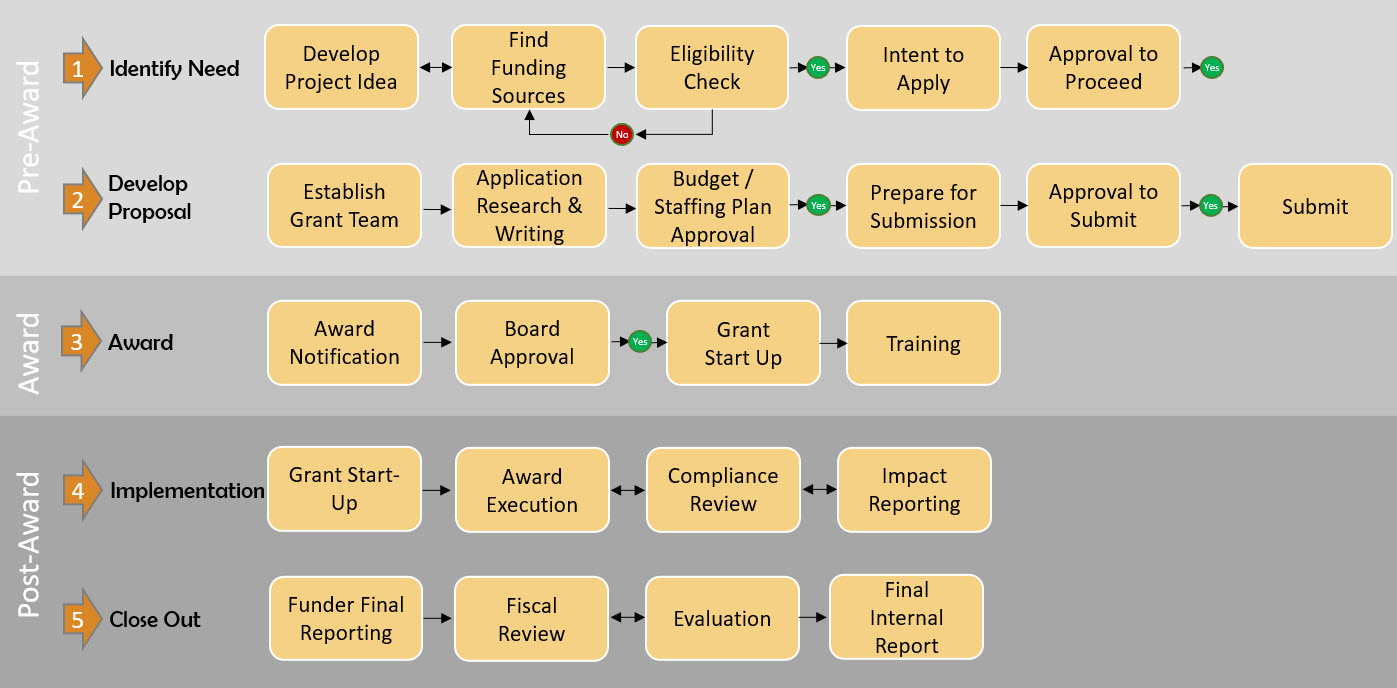Introduction
The Institutional Research, Planning, and Grants (IRP&G) team provides leadership in identifying, securing, and managing external competitive grant funding to support Palomar College’s mission of fostering student success and advancing its strategic priorities. Our key objectives are to:
- Identify Funding Opportunities: Actively seek external competitive funding opportunities that align with the College’s strategic goals.
- Support Grant Development: Assist faculty and staff in pursuing competitive grants by providing guidance, resources, and expertise for developing strong, compliant proposals.
- Ensure Compliance and Oversight: Monitor grant-funded projects and sub-awards to address compliance with grantor requirements, college policies, and applicable federal and state regulations.
Resources:
Grant Development and Management Life Cycle
The grants lifecycle at Palomar College encompasses the comprehensive processes of identifying, securing, managing, and closing out a grant. This lifecycle is divided into five key stages, each with specific tasks and decision points, ensuring alignment with BP 3280 Grants and AP 3280 Grants:
- Identify Need: The first step is recognizing the College's needs based on its strategic plans, such as Vision Plan 2035, Student Equity Plan, and other guiding documents. During this phase, the potential for external funding is evaluated to address gaps and enhance the College's capacity to meet its goals.
- Develop Proposal: Once the need is identified, a team is assembled to create a competitive grant proposal. This team typically includes the Supervising Administrator, Grants Manager, and Grant Accountant. The proposal development process involves defining project objectives, creating a budget, securing institutional approvals, and drafting the application in compliance with grant guidelines.
- Award: Upon notification of a successful award, the grant must receive Governing Board approval before initiating any grant-related activities. This formal approval ensures institutional oversight and alignment with College policies. Following approval, the project moves into the planning and execution phase.
- Implementation: During this phase, the grant-funded activities are executed according to the project plan. Regular monitoring, compliance checks, and reporting are critical to ensure that the project meets its objectives and adheres to both the grantor’s requirements and Palomar’s internal policies.
- Close Out: As the project nears completion, the final steps involve ensuring all grant activities are completed, submitting the required reports, and undergoing any necessary financial reconciliation or audits. Compliance with financial and audit requirements is essential for successfully closing out the grant.
Resources:
Grant Development
The Institutional Research, Planning, and Grants (IRP&G) team supports the development and management of competitive grant proposals with a minimum funding threshold of $50,000. Federal grants (both direct and sub-awards), however, are supported regardless of the funding amount.
Resources:
Faculty and Staff interested in applying for a grant must complete the Intent to Apply Form before initiating the application process, in accordance with AP 3280 Grants.
Completed forms should be submitted to Pauline Moroz, Grants Manager. The Intent to Apply Form allows IRP&G to provide early support, including evaluating the suitability of the funding opportunity, coordinating internal resources, and developing a timeline to meet application deadlines.
Grant Management
Effective grant management is essential to ensuring that funded projects achieve their objectives while adhering to compliance requirements. The Institutional Research, Planning, and Grants (IRP&G) team provides guidance and support throughout the implementation and close-out phases of the grant lifecycle. Palomar College utilizes GrantNavigator, a grant management software, to track grant award milestones.
In addition, the IRP&G team offers the following support:
- Compliance Guidance: Expertise on adherence to grantor requirements and Palomar’s internal policies, including cost allowability and time and effort reporting.
- Stakeholder Coordination: Facilitating communication between project leads, internal departments, and external partners to ensure alignment and address potential challenges.
- Progress Reporting: Assisting with interim progress reports and data collection to demonstrate project outcomes.
- Final Reporting: Providing templates and guidance for preparing and submitting required final reports to the grantor.
- Financial Reconciliation: Collaborating with Fiscal Services to reconcile budgets, document matching funds, and address any unspent or over-expended funds.
- Audit Readiness: Checking that all records, including financial documentation and time and effort certifications, are complete and meet audit standards.
- Deliverable Review: Confirming that all promised deliverables, such as publications or program outcomes, are completed and documented.
- Record Retention: Advising on proper record retention and archiving to comply with federal, state, and institutional policies.
Resources:


